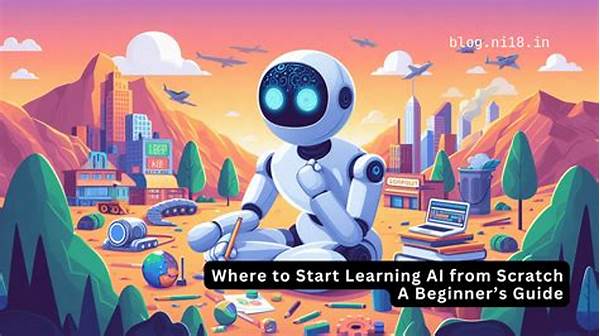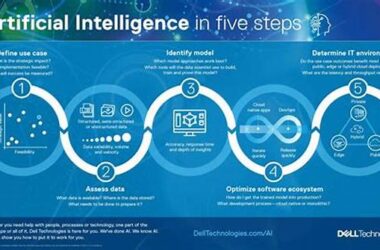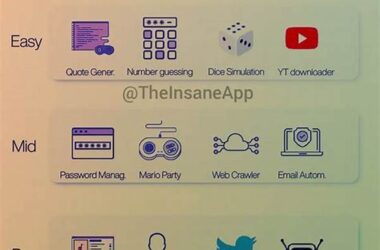How to Start Learning AI as a Beginner
In the digital age, where opportunities seem boundless, diving into the world of Artificial Intelligence (AI) may seem not only exciting but also crucial. The allure of AI is intoxicating, with its promise to automate tasks, enhance productivity, and unlock new realms of creativity. If you’re here, you might be grappling with the question: how to start learning AI as a beginner? This journey begins much like any other grand adventure— with curiosity, a sense of wonder, and the right tools in your backpack. AI no longer remains the domain of just rocket scientists and tech wizards. It now beckons to anyone willing to explore its depths. Imagine mastering AI and becoming the reason for groundbreaking innovations. It’s like being handed the steering wheel to a futuristic car, one that could drive the world forward. As enticing as it sounds, stepping onto this path requires a strategy, a roadmap to navigate the intricate maze of AI technologies. But fear not! The gateway to AI is more welcoming than it appears and can be tailored to your pace and interests.
Read More : Why Every Creator Should Learn Ai Tools
Why should you, a newbie, consider learning AI? Firstly, AI is at the forefront of technological evolution, influencing fields from healthcare to entertainment, and getting in on the action could mean being a part of something monumental. Secondly, AI skills are in high demand, with businesses across the globe clamoring for talent that can help them harness the power of AI. It’s not just about coding; it’s about solving real-world problems. Lastly, exploring AI can be both a fulfilling intellectual pursuit and a catalyst for career growth. Now that I have your attention, picture this: by learning AI, you could design applications that predict market trends, create algorithms that offer personalized learning experiences, or even develop models that aid in medical diagnoses.
Discover the Exciting Path to AI Mastery
Embarking on this AI journey may seem daunting, but take heart—it all begins with laying a solid foundation. Start with understanding the fundamental concepts such as machine learning, neural networks, and data science. There are numerous resources available, from beginner-friendly books to online courses by industry experts. Make sure to choose materials that best fit your learning style, whether it’s videos, interactive coding platforms, or podcasts. The journey of how to start learning AI as a beginner is as much about learning as it is about networking. Join AI communities, both online and offline, to connect with like-minded individuals. Share your progress, ask questions, and even attend meetups or webinars. This not only enhances your knowledge but keeps your motivation levels high.
Further down your learning curve, apply your newfound skills by working on real-world projects. Coding competitions, internships, and freelance work offer hands-on experience that’s invaluable. By testing your skills in genuine scenarios, you solidify your knowledge and gain insights into practical applications. The satisfaction of seeing your AI creations come to life is second to none. If at times the path seems overwhelming, remember that every AI expert once stood where you do now—at the beginning, eyes wide with curiosity and dreams of decoding the future. So, persevere, embrace the occasional challenges, and step confidently forward. AI is not the future; it’s the present. Welcome to the journey!
Paving Your Way: Steps for Absolute Beginners
You might be thinking, “How do I effectively take the first step in learning AI?” Let me take you through a strategic approach.
Start by familiarizing yourself with programming languages essential for AI, such as Python. Python is considered the lingua franca of AI due to its simplicity and vast library support for AI applications. Enroll in online courses focused on AI and machine learning from platforms like Coursera, edX, or Udacity. These courses offer comprehensive curricula that walk you through the basics and gradually build up to advanced topics.
Another crucial step is to explore AI tools and frameworks such as TensorFlow, PyTorch, or scikit-learn. Mastering these will equip you with practical skills necessary for developing AI models. Don’t hesitate to experiment—you learn a great deal from trial and error.
Crucially, enhancing your mathematics skills, especially in areas like statistics and linear algebra, can provide a deeper understanding of how AI algorithms work. It’s like learning the grammar of a new language – while you might get by without it, mastering it provides fluency.
Never underestimate the power of academic papers and AI case studies. These resources provide insights into cutting-edge research and real-life applications, offering inspiration and illustrating how experts tackle complex AI problems.
Lastly, keep an open mind and maintain your enthusiasm. The world of AI is dynamic, and the learning never truly ends. By immersing yourself in AI, not only do you stay updated with the latest trends, but you also contribute to the evolving AI conversation, sharing your own unique insights and solutions.
Understanding the Basics
Understanding the basics of AI is akin to learning the alphabet before crafting poetry. Start with key concepts like algorithms, machine learning, and neural networks. Ensure you grasp foundational knowledge, which will serve as the bedrock upon which more complex ideas are built.
In sum, how to start learning AI as a beginner is a question of curiosity coupled with dedication. While the path might be challenging at times, the rewards—both intellectual and professional—are worth every ounce of effort. So, arm yourself with resources, build a strong support network, and immerse yourself in this awe-inspiring field. The realm of possibilities is endless, and tapping into it might just be the most exciting journey of your life.
AI Aspiration: Set Your Learning Goals
A Curious Discussion: AI’s Growing Presence
AI’s growing presence in our lives cannot be overstated. From predictive text on your smartphone to personalized recommendations on your streaming services, AI has subtly woven itself into our daily routines, simplifying tasks and optimizing our experiences. However, it’s not all rosy. Discussions around AI also encompass ethical dilemmas, job displacement concerns, and the need for transparent algorithms. As you discover how to start learning AI as a beginner, consider these larger conversations as part of your learning journey. Engaging with a balanced view of AI’s benefits and challenges will better prepare you to contribute meaningfully to the field.
Bridging the Knowledge Gap
The challenge many beginners face lies in bridging the knowledge gap between simple AI concepts and their complex, real-world applications. AI can be daunting, with its techno-jargon and rapid advancements. Yet, as an aspiring learner, you hold the potential to transform this vast field into something comprehensible and impactful. Start with bite-sized learning, break down complex topics into manageable parts, and continuously apply what you learn. Your confidence and understanding will grow, helping bridge that knowledge gap.
Beginner’s Guide to AI Exploration
Beginning a journey into the realm of AI can feel like stepping into a bustling metropolis as a first-time traveler. However, with the right guide in hand, navigating this world becomes not only manageable but thrilling. Knowing how to start learning AI as a beginner requires you to first establish a clear perspective and purpose for your exploration.
Why AI? The Beginner’s Insight
The appeal of AI spans various fields, from automating menial tasks to revolutionizing industries. As you embark on your learning journey, focus on understanding why AI captivates you personally. Is it the innovation potential? The challenge of pushing human boundaries? Or perhaps the notion of ethical AI intrigues you? Grounding your interest can provide a meaningful direction and fuel your passion for continued learning.
Mapping the Journey
Before diving deep into sophisticated AI topics, build a roadmap of your learning experience. This involves selecting relevant study materials, setting achievable goals, and periodically assessing your progress. An effective plan includes a balance of theory, application, and evaluation, allowing you to cultivate a well-rounded understanding that not only involves you learning but actively participating in the AI dialogue.
Baby Steps, Giant Leaps
Taking small, consistent steps lays the groundwork for significant advancement. Begin with fundamental AI concepts, and as confidence accrues, transition into more complex arenas like deep learning or AI ethics. Celebrate each achievement—no matter how small—as it signifies a stride toward your overarching AI mastery.
To wrap up, engaging in AI learning as a beginner is much more than a technical skill acquisition; it’s an adventure that expands your worldview, challenges your intellect, and empowers you to innovate. Dive into this exhilarating journey and see where the currents of knowledge might take you.



